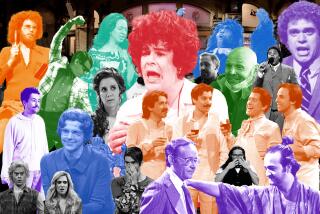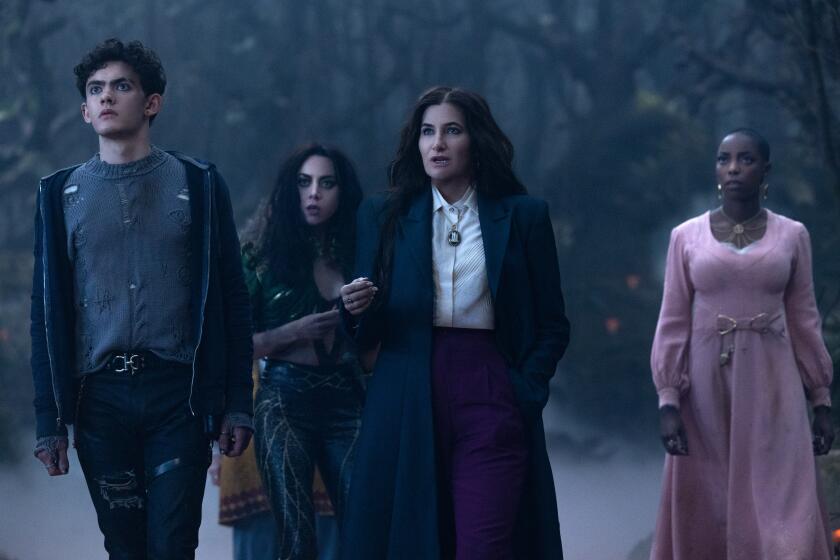Hollywood’s Spooky Spirituality
If high ratings for the ridiculous NBC miniseries “Revelations” are a bellwether, Hollywood’s next big thing may be spooky spirituality. Either that or the feel-good “Kingdom of Heaven”-type religious plot that, like some blunt instrument, seeks to bludgeon audiences into accepting an awesomely righteous (read Emmy or Oscar-inducing) social theme.
In hopes of nudging the industry back to a more thoughtful (and realistic) take on faith (think “Kundun,” “Dead Man Walking” or “Angels in America”), let me offer this pitch for a biopic:
Big-hearted guy with a bad heart plays the father of a heart-transplant patient in heartwarming community theater. Offstage, he raises five daughters, sells real estate and, through his own artistic endeavors -- here’s the realistically nuanced depiction of religion in society -- gains the courage to tell his own minister that people are dying because of the way many black churches interpret God’s word.
There are no shoot ‘em ups or car crashes. But there is some sex. And the big-hearted guy has style.
See for yourself. Tonight’s the last chance to catch George Gant in “A Long Bridge Over Deep Water,” at the Ford Amphitheatre.
In the play, Gant is an African American dad whose daughter comes home from the hospital with the heart -- and concomitant passion for life -- of a recently deceased Jewish poet.
In real life, Gant is an African American dad, in rehab after double-bypass surgery. And even though acting can tax his heart, he’s in the play because he reveres its message. “A Long Bridge Over Deep Waters” is a dramatization of human interconnectedness. It culminates a four-year play cycle, during which its producers worked with more than 50 religious and community groups to explore how their beliefs unite and divide them.
The company, Cornerstone Theater, has performed at a Buddhist temple, a synagogue, a Bahai center, an Islamic school and a Protestant church. Muslims, Buddhists, Hindus, Jews, Roman Catholics and Protestants -- including gays, lesbians, transsexuals and even some atheists -- helped write and act in the plays.
The theater’s professionals made sure that the plays themselves challenged assumptions. Hindus wrestled with the interplay of good and evil, Jews explored why people leave the fold, and African Americans grappled with black churches’ harsh attitudes toward HIV/AIDS.
Gant and his wife head an HIV/AIDS ministry at their congregation, so Cornerstone enlisted them to lead small group discussions about the virus. The couple saw a need to support those whom black churches often shun. Uneasiness with gay and lesbian sexuality has caused some blacks to see HIV/AIDS as a result of sin rather than a virus. Gant says he has fought with his minister about that. “He thinks God condemns those with it. But God is really mysterious. We had several people in the congregation with AIDS, and he didn’t even know it.”
The Gants were surprised to learn how many congregants knew someone affected by the virus. But most said this was the first time they felt comfortable discussing HIV in a religious setting.
Cornerstone distilled these fears and frustrations into a play it staged two years ago. The story depicted a church deacon -- a closeted bisexual -- who infects his wife with HIV. Gant as the minister struggled to heal a congregation torn between condemning the deacon’s “sin” and helping the couple survive both infection and infidelity.
Gant has since become co-chairperson of the Urban Church Task Force on HIV/AIDS. He finds that even some church members who can accept their children’s unplanned pregnancies recoil upon hearing a child has the sexually transmitted disease.
“They accepted the grandchild, but they wouldn’t accept AIDS. But it happens the same way.”
Gant says he may not agree with everyone’s “choice of lifestyle.” But he sees his job as loving others not judging them.
Unfortunately, judging others comes so much easier. And it’s more fun.
There’s deep satisfaction in dividing the sinners from the saints. That was the draw of “Revelations” -- you knew who the bad people were because they were always practicing yoga and jabbering in a strange tongue.
People with HIV/AIDS speak in our tongue. That was George Gant’s revelation. By Hollywood standards, it’s a small one.
More to Read
The biggest entertainment stories
Get our big stories about Hollywood, film, television, music, arts, culture and more right in your inbox as soon as they publish.
You may occasionally receive promotional content from the Los Angeles Times.










